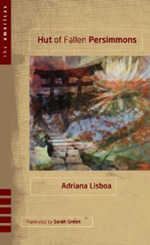

Texas Tech University, hardcover, 9780896727212
It is interesting to read a book that you are certain will be a love story—though you aren't sure whether happy or ill-fated, requited or unrequited—only to find yourself perpetually poised, waiting for that romance to start. Haruki, an illustrator of books, and Celina, an embroidery artist, meet by chance on a subway in Rio de Janeiro. He is attracted to her and she is somewhat intrigued by him or, it may be, simply by something new in her life. Haruki has a commission to illustrate a journal of the Edo poet Matsuo Bashō, and he wants to travel to Japan to Rakushisha, the Hut of Fallen Persimmons, where Bashō stayed while writing much of it. On impulse, he invites Celina. Quite improbably, even while thinking that she wants to answer no, Celina accepts. Some kind of relationship between Haruki and Celina seems inevitable. From their deliberations as they think about the possibility of just sex or of a deeper relationship, it seems inevitable to them, also.
And yet, time seems to stall once they reach Japan. Lisboa catches that moment of something impending, neither occurring nor abandoned, and prolongs it. As Haruki and Celina use this break from their normal lives to reflect, they reveal parts of their pasts that have left them emotionally caught, unable to move beyond a certain condition: Haruki is in love with a married woman who, though she cares for him, will not leave her husband; Celina has some misfortune in her past that leaves her scarred and wanting no one close to her.
As the two separate, he to research his illustrations and she to explore, I found myself contemplating the numerous haiku that fill the story as Haruki reads through Bashō's journal. I find a kind of stillness in haiku, arising from the fact that they are based upon a single moment of perception by the senses rather than interpretation or explanation, and that same sort of stillness seemed to pervade the story. It had that same quality of a moment caught up out of time and presented to the reader. There is no table of contents or chapter numbering but, intrigued, I stopped and paged through the book and counted 17 chapters, corresponding to the 17 morae of a haiku.
Beyond this resemblance in form, Lisboa has structured the story to include the juxtaposition of two ideas that is essential to a proper haiku, the internal comparison that can be either a contrasting or a mirroring of images. Bashō's poem of leave-taking from Rakushisha sets the summer rain against an image of departing and, in a conscious echo, Haruki and Celina, though physically apart, experience the same moment of watching "the gentle rain that begins to fall" as they make their decisions about their emotional lives—whether to accept where they are or to move on.
Lisboa's prose is beautiful, even in translation. There was something crystalline and unfussy about it that delighted me.
For all the apparent simplicity of the language, however, it is a book that requires close attention; it is not something
to be read while drowsy on the beach. It is full of unheralded switching between timelines, unsignaled changing of voices,
and a use of pronouns that demands awareness. I might have preferred it without this approach; it was an extra effort that
did not seem to enhance the theme or mood. However, that is my only complaint about this story that has left me thinking
about it well after I finished reading it.

